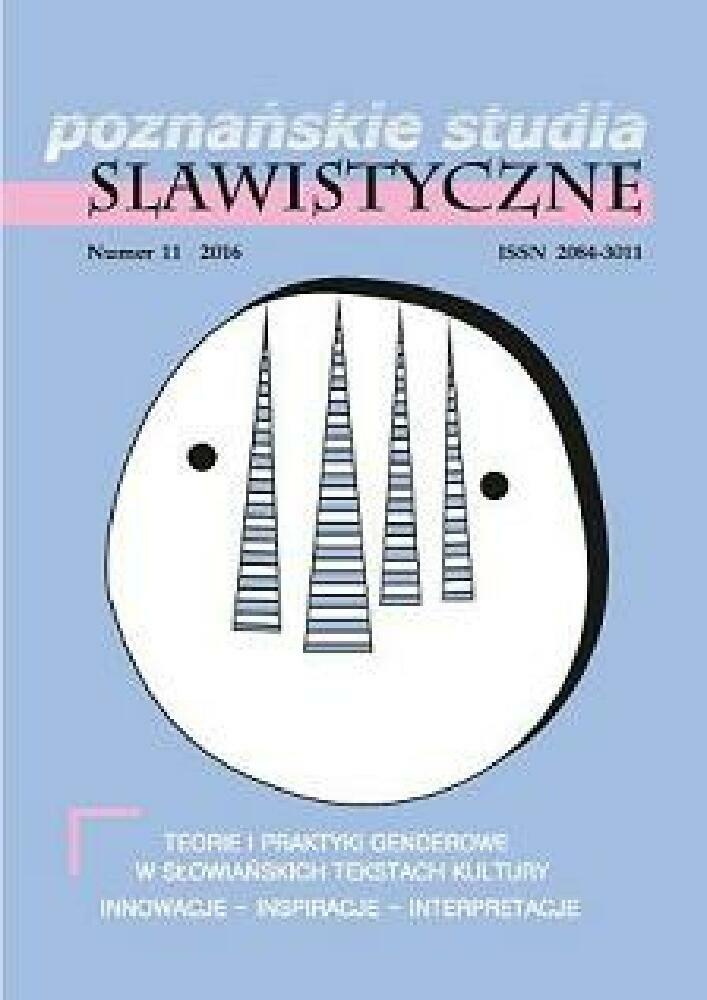Abstract
The article analyses Irena Krzywicka’s coverage of the so-called Gorgonowa case, in which a Yugoslavian citizen, Rita Gorgon, was accused of killing her teenage stepdaughter. The authors notice two seemingly dissonant practices in the analysed text: Krzywicka’s involvement in the fight for women’s rights is accompanied by taking away the accused’s voice. The feminist writer treats the case as a pretext for a critique of the bourgeoisie and its institutions, which she achieves by revealing and exaggerating the theatricality coupled with sadism present in the court proceedings. The strategy of exoticisation of Rita Gorgon, which affected her perception as a stranger, is also explored. In the emotionally charged description of the trial, there is surprisingly little space for the voice of the accused herself, who is not represented by Krzywicka, but merely presented. The pursuit of rehabilitation undertaken by Rita Gorgon’s daughter and granddaughter appears to be an attempt to symbolically return the voice to the accused and to recreate the “feminine continuum”.References
Achebe Ch., 1977, An Image Of Africa, “Massachusetts Review” no. 18, pp. 782–794.
Araszkiewicz A., 2009, Sprawa Nieznalskiej a proces Gorgonowej, “Obieg”, <https://archiwum-obieg.u-jazdowski.pl/teksty/5848>, 15.01.2015.
Atraud A., 1978, Teatr i jego sobowtór, trans. J. Błoński, Warszawa.
Cixous H., 2001, Śmiech Meduzy, in: Ciało i tekst. Feminizm w literaturoznawstwie – antologia szkiców, ed. A. Nasiłowska, Warszawa, pp. 168–189.
Daszczyński R., 2014, Wołali na mnie Gorgonicha, “Gazeta Wyborcza. Duży Format”, <http://wyborcza.pl/duzyformat/1,137939,16002686,Wolali_na_mnie_Gorgonicha.html>, 15.01.2015.
Drugi powszechny spis ludności z dn. 09.XII.1931 roku. Mieszkania i gospodarstwa domowe. Ludność. Stosunki zawodowe. Miasto Lwów, 1937, Statystyka Polska, Seria C, Zeszyt 58, Warszawa.
Ellis K.F., 1989, The Contested Castle. Gothic Novels and the Subversion of Domestic Ideology, Urbana–Chicago.
Freud S., 2007, Ekonomiczny problem masochizmu, in: idem, Psychologia nieświadomości, przeł. R. Reszke, Warszawa.
Gazda G., Izdebska A., Płuciennik J. (eds.), 2002, Wokół gotycyzmów. Wyobraźnia, groza, okrucieństwo, Kraków.
Gilbert S.M., Gubar S., 1979, The Madwoman in the Attic. The Woman Writer and the Nineteenth-Century Literary Imagination, London.
Górnicka-Boratyńska A., 2001, Stańmy się sobą. Cztery projekty emancypacji (1863–1939), Izabelin.
Hanisch C., 1969, The Personal is Political, in: Notes from the Second Year: Women’s Liberation; Major Writings of the Radical Feminists, eds. S. Firestone, A. Koedt, New York, pp. 76–78.
Heiland D., 2004, Gothic and Gender. An Introduction, Malden. Karta ewidencyjna oskarżonej Margerity Rity Gorgon, , 6.01.2015.
Kraskowska E., 2003, Piórem niewieścim. Z problemów prozy kobiecej dwudziestolecia międzywojennego, Poznań.
Krzywicka I., 1998, Sąd idzie, Warszawa. Krzywicka I., 2013, Wyznania gorszycielki, Warszawa.
“Literatura na Świecie” 1994, no. 10 (special issue Markiz de Sade).
Marzec W., 2011, Zapomniani protoplaści. Archeologia refleksji o sadyzmie i masochizmie, “Teksty Drugie” no. 4 (130), pp. 220–233.
Matuszewski K., 2002, Okrucieństwo u Sade’a, in: Wokół gotycyzmów: wyobraźnia, groza, okrucieństwo, eds. G. Gazda, A. Izdebska, J. Płuciennik, Kraków, pp. 299– –308.
Phillips U., 2014, Gotycyzm, in: Encyklopedia gender. Płeć w kulturze, eds. M. Rudaś-Grodzka, K. Nadana-Sokołowska, A. Mrozik, K. Szczuka, K. Czeczot, B. Smoleń, A. Nasiłowska, E. Serafin, A. Wróbel, Warszawa, pp. 170–174.
Praz M., 2010, Zmysły, śmierć i diabeł w literaturze romantycznej, Gdańsk.
Spivak G., 2011, Czy podporządkowani inni mogą przemówić?, przeł. E. Majewska, “Krytyka Polityczna” no. 24–25, pp. 196–239.
Szpakowska M., 2012, “Wiadomości Literackie” prawie dla wszystkich, Warszawa.
Walaszek A., 2007, Migracje Europejczyków 1650–1914, Kraków.
Wieczorkiewicz A., 2011, Hotentocka skóra Saartjie Baartman, “Teksty Drugie” no. 4, pp. 253–274.
Williams L., 2010, Hard core. Władza, przyjemność i „szaleństwo widzialności”, trans. J. Burzyńska, I. Hansz, M. Wojtyna, Gdańsk.
Zawiszewska. A., 2010, Życie świadome. O nowoczesnej prozie intelektualnej Ireny Krzywickiej, Szczecin.
Żurek E., 1975, Gorgonowa i inni, Warszawa.
License
Copyright (c) 2016 Anna Kurowicka, Ewa Serafin, Ewa Wróblewska-Trochimiuk

This work is licensed under a Creative Commons Attribution-NoDerivatives 4.0 International License.
